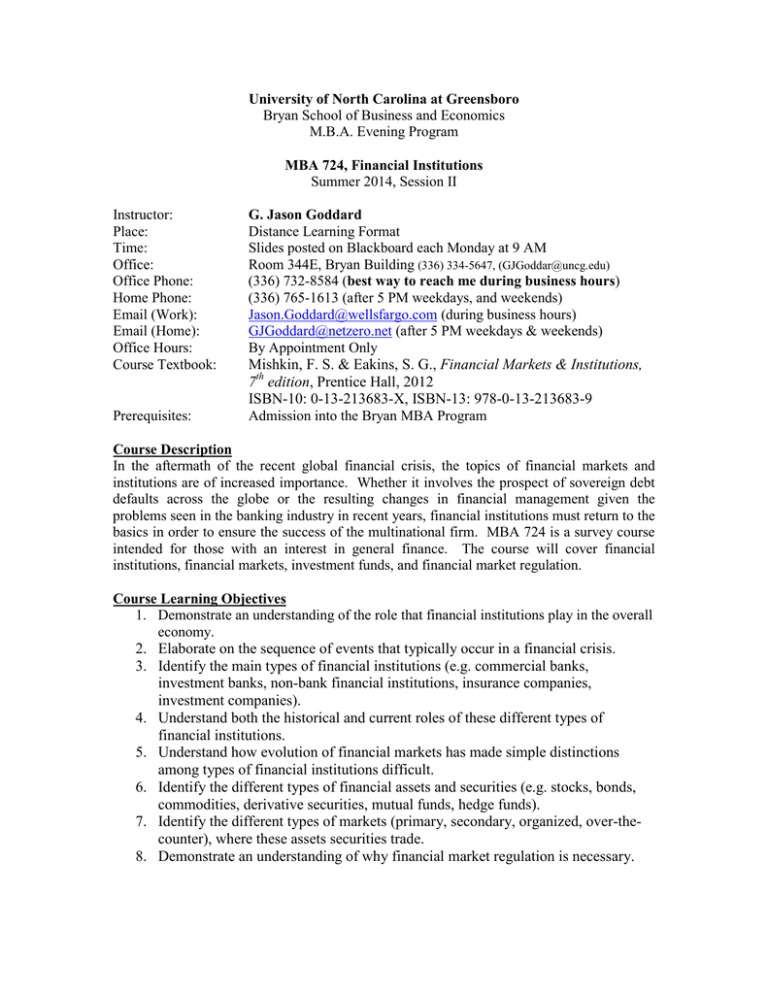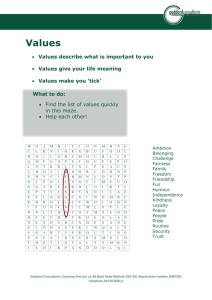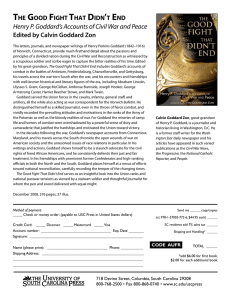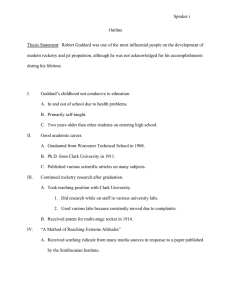University of North Carolina at Greensboro MBA 724, Financial Institutions
advertisement

University of North Carolina at Greensboro Bryan School of Business and Economics M.B.A. Evening Program MBA 724, Financial Institutions Summer 2014, Session II Instructor: Place: Time: Office: Office Phone: Home Phone: Email (Work): Email (Home): Office Hours: Course Textbook: Prerequisites: G. Jason Goddard Distance Learning Format Slides posted on Blackboard each Monday at 9 AM Room 344E, Bryan Building (336) 334-5647, (GJGoddar@uncg.edu) (336) 732-8584 (best way to reach me during business hours) (336) 765-1613 (after 5 PM weekdays, and weekends) Jason.Goddard@wellsfargo.com (during business hours) GJGoddard@netzero.net (after 5 PM weekdays & weekends) By Appointment Only Mishkin, F. S. & Eakins, S. G., Financial Markets & Institutions, 7th edition, Prentice Hall, 2012 ISBN-10: 0-13-213683-X, ISBN-13: 978-0-13-213683-9 Admission into the Bryan MBA Program Course Description In the aftermath of the recent global financial crisis, the topics of financial markets and institutions are of increased importance. Whether it involves the prospect of sovereign debt defaults across the globe or the resulting changes in financial management given the problems seen in the banking industry in recent years, financial institutions must return to the basics in order to ensure the success of the multinational firm. MBA 724 is a survey course intended for those with an interest in general finance. The course will cover financial institutions, financial markets, investment funds, and financial market regulation. Course Learning Objectives 1. Demonstrate an understanding of the role that financial institutions play in the overall economy. 2. Elaborate on the sequence of events that typically occur in a financial crisis. 3. Identify the main types of financial institutions (e.g. commercial banks, investment banks, non-bank financial institutions, insurance companies, investment companies). 4. Understand both the historical and current roles of these different types of financial institutions. 5. Understand how evolution of financial markets has made simple distinctions among types of financial institutions difficult. 6. Identify the different types of financial assets and securities (e.g. stocks, bonds, commodities, derivative securities, mutual funds, hedge funds). 7. Identify the different types of markets (primary, secondary, organized, over-thecounter), where these assets securities trade. 8. Demonstrate an understanding of why financial market regulation is necessary. 2 9. Describe the historical evolution of financial regulation in the United States and the rest of the world and explain why financial market regulation is ever changing. Class Procedures The content of this course will be conveyed in an online format via lecture slides, case studies, and review of the required text book. Each approach in the mix is designed to develop and elaborate on the content of the course. Each week by Monday at 9 AM, the slides for the week will be posted on Blackboard. Students are responsible for reading the chapters in the text as well as reviewing the slides on Blackboard for each week. Students should discuss the cases and other issues which arise from the weekly readings on Blackboard’s discussion forum. Each week specific questions will be posted on Blackboard for discussion. Students have until Sunday at 3 PM to answer the questions for a given week. Grading Given the amount of material covered in so short a period of time, there will be five weekly quizzes in the course. Each quiz will consist of twenty multiple choice questions and relate to the readings for that particular week. The weekly quiz questions will be posted on Blackboard by the end of the day on Monday of the week of the exam. Students will have until Sunday at 3 PM to complete the quiz. The quiz time will be limited to 1 hour. Weekly Quizzes Term Paper Individual Contribution Total Grading Scale 94-100 A 90-93 A87-89 B+ 83-86 B 40% 40% 20% 100% 20 MC questions weekly Due By July 31 Blackboard Discussion Board 80-82 B77-79 C+ 70-76 C < 70 F Term Paper Given the breadth of topic coverage in this course, there should be numerous topics of which a student would wish to gain a more thorough understanding. The purpose of the course term paper is to allow the student to explore further issues related to Financial Markets and Institutions in order to provide a timely and interesting analysis. Possible term paper topics are shown below: • • • • • • EU Sovereign Debt Crisis: Cause and Sustainable Solution BASEL III: Are increased capital requirements the answer? Occupy Wall Street: Are banks the bad guys and are credit unions the good guys? Can Regulation tame the speculative bubble? A view after the fall Globalization and the Free Flow of Funds Over Borders: Pros and Cons Term Paper topic selected by students and approved by instructor 3 Papers should be limited to ten pages exclusive of any exhibits. The report/research project will rely on published material in journals and periodicals such as The Economist, Financial Times, Wall Street Journal, IMF/World Bank publications, OECD sources, and internet sources. The most effective papers will be those that best integrate the course content with specific paper recommendations. Papers will be graded based on professionalism, the logical flow of ideas and recommendations, and the sources cited. While this is an online course, students may opt to complete the term paper either individually or in groups of up to four students. The course term paper is due by Thursday July 31, 2014 at 5 PM. Individual Contribution Individual contribution points will be awarded based on the quality of the content added to the class discussions as opposed to the quantity of the content added. Questions and discussions posed by students on Blackboard’s discussion forum should be relevant to the material being covered in the class. A student will receive class contribution points for adding to the discussion forum via meaningful, insightful comments. What I am looking for is evidence that students are integrating the textbook material with the supplemental material covered each week. Biographical sketch of the Instructor Goddard, G. Jason is currently Vice President at Wells Fargo, where he has been a commercial lender for over 15 years. Mr. Goddard is currently real estate risk advisor for income producing investment real estate loans in the business and community banking segments, and works in Winston-Salem. He obtained his MBA from the Bryan School at the University of North Carolina at Greensboro. Mr. Goddard is currently instructor at Wake Forest University, UNC-G, and is the Assistant Editor of the Journal of Asia-Pacific Business, where he has authored numerous articles. Mr. Goddard teaches the investment real estate course at both the undergraduate and master’s level at Wake Forest University. Mr. Goddard also teaches the subject annually at the RMA-ECU Commercial Real Estate Lending School at East Carolina University in Greenville, NC. He has also taught both an undergraduate and master’s level course in international business at UNCG, and has coordinated the America in the Global Economy lecture series at UNCG. Mr. Goddard has twice led a group of MBA students on the study abroad program in Paris, France, and teaches annually in Ludwigshafen Germany at the University of Applied Sciences. Mr. Goddard has taught Customer Relationship Management, as an elective in the UNCG MBA program as well as taught the course in Market Psychology at Wake Forest University. Mr. Goddard is co-author of International Business: Theory and Practice, Second Edition, which was issued by M.E. Sharpe Publishers in September 2006. His second co-authored book, Customer Relationship Management: A Global Perspective was issued by Gower Publishing in May 2008. His third co-authored book, “The Psychology of Marketing: Cross-Cultural Perspectives”, was published by Gower Publishing in October 2010. His fourth co-authored book, “Real Estate Investment: A Value Based Approach” was published by Springer in July 2012. Mr. Goddard’s latest book is entitled International Business: A Course on the Essentials, and was issued by M.E. Sharpe in October 2013. 4 Week Date 1 June 23-27 MBA 724 Course Schedule (Summer 2014) Topic Introduction & Financial Crisis Assigned Reading Ch. 1, 2 & 8 Topics for review: class syllabus, strong/weak dollar impact on consumers/businesses, methods and aims of monetary policy, asymmetric information, moral hazard, diversification benefits, stages of financial crises in developed and developing world Week Date 2 June 30-July 3 Topic Financial Markets Assigned Reading Ch. 11-14 Topics for review: money, bond and stock market instruments, computing bond discounts and yields, Gordon Dividend Growth model, PE Approach, Goals of SEC, Security Regulation, FHA and Fannie Mae, goals of lowering moral hazard in lending Week Date 3 July 7-11 Topic Financial Institutions Assigned Reading Ch. 19, 21 & 22 Topics for review: Historical evaluation of banking industry, Glass-Steagall Act, FDIC, McFadden Act, National Banking Act of 1863, Types of insurance and benefits for each, brokers versus dealers, role of venture capital firms, stop loss order vs. limit order vs. market order Week Date 4 July 14-18 Topic Financial Institution Regulation Assigned Reading Ch. 7, 18 & 25 Topics for review: Lemons problem, credit rating agency conflicts of interest, 8 basic facts of financial structure, principal-agent problem, FDIC & deposit insurance, Too Big to Fail Policy, Payoff vs. purchase & assumption, Dodd-Frank 2010, History of Thrifts, Zombie S&Ls, credit unions and taxes Week 5 Date July 21-25 Topic International Perspectives Assigned Reading Ch. 15, 16 & 20 Topics for review: Currency appreciation & depreciation, theory of Purchasing Power Parity, Interest parity condition & returns, central bank intervention: theory and practice, currency boards vs. seigniorage, Bretton Woods agreement, Balance of Payments, Net Asset Value, Types of Mutual Funds, & conflict of interest in mutual funds Week 6 • Date July 28-Aug 1 Topic Term Paper Due Course Term Paper is due by Thursday July 31, 2014 at 5 PM








